The Egyptian political spectrum is in constant change. Although some columnists carry on with their analysis of Mohamed Morsy’s very recent reforms, others attempt to broadly dissect the repercussions on the Egyptian community. Writers in different newspapers have studied the relationship between the media and the armed forces and how boundaries between the two sides have swapped after the 25 January revolution.
Some other columnists dedicate their pieces to ex-presidential candidates, calling on them to unify to stand against the dominating current of Political Islam. On another note, the recent move of having the first Egyptian veiled news anchor has stirred debate and controversy on the future of media and the extent of Islamic dominance on state TV.
The media and military… boundaries before 25 January
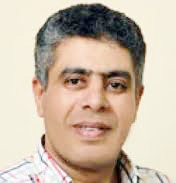
Emad Al-Din Hussein
Al-Shorouk newspaper
The relationship between the Egyptian media and the army has always been knotty, argues Hussein. In the period between the 1952 military coup d’état and the 25 January 2011 revolution, media professionals were conversant with the bold red lines the military was sensitive to. Citing an example, the writer states that a single report of a deceased soldier could not be announced without the green light of the country’s high-ranking officials.
Hussein’s central argument rests on the conviction that now the once-ruling Supreme Council of Armed Forces has been confined back to the barracks, the media continues to have a tight-fisted clench in all news relating to the army. Nevertheless, journalists should bear in mind that the impact of news published on the military highly reflects on the body’s morals.
Despite the importance of maintaining a strong free press, Hussein notes that media holds a larger portion of responsibility in displaying the swaying image of the armed forces. Hussein suggests that the media’s revolutionary thrust makes journalists enter a pitched duel with the military. The writer notes that media professionals, who well-digested the true convictions of the 2011 revolution, will never stray from their lofty revolutionary goals in their profession. Irrespective of the continuing dispute between media and the military, the writer wraps up his column stating that both sides need to ponder a midway solution that ensures the eminence of the armed forces and the freedom of the press in one bundle.
The President’s rights and the people’s rights
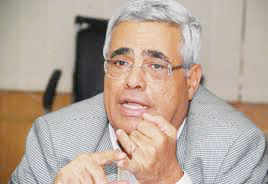
Hassan Nafaa
Al-Masry Al-Youm newspaper
In a reminder of Mohamed Morsy’s first official speech when he vowed to safeguard the people’s rights and affirmed his lack of personal interest in Egypt’s rule, Nafaa fails to spot evidence for the President’s fulfillment of his early promises. As the country witnesses a critical stage of political perplexity and a widespread fear of the future, the writer assumes that Egyptians will keep watch on Morsy’s, words versus the actual implementation.
Nevertheless, Morsy wouldn’t be worse than Mubarak, Nafaa estimates. But the writer wishes to see him courageously announcing the budget allocated for the presidential institution and minimizing all its unnecessary expenses. Instead of obscuring ordinary Egyptians, the writer suggests that Morsy turn the many presidential retreats, laid out all over the country’s margins, into museums or potential investment locations. Nafaa denounces the way Morsy still follows the path of his predecessor, moving around in convoys accompanied by strict security procedures. This discourse constitutes in Nafaa’s estimation no more than a repetition of the practical life of the ousted regime. He then condemns the call to establish an Egyptian delegation that roams around different cities to survey Egyptian expatriates and follow up on their feedback on the new constitution. Nafaa regards the initiative as an extravagance to the country’s resources, whereas newly developed technological tools can obviate all the travel expenses. Contextualising this problem, Nafaa concludes his column stating that the presidential institution needs to rethink methods that ignite new schemes of creative strategies and safeguard the people’s rights- as earlier promised.
The budgets of the army and the Muslim Brotherhood
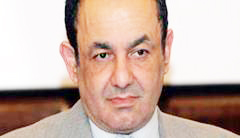
Amr Al-Shobaki
Al-Masry Al-Youm newspaper
Although Egypt succeeds in taking its early baby steps towards transparency, Amr Al-Shobaki criticizes the Muslim Brotherhood’s tenacious rejection of unveiling its budget to the public. The worst crux in the situation appears as the once-banned group rapidly climb up the ladder of Egypt’s authority, yet still persist on acting higher than laws and regulations. Al-Shobaki denounces the stubbornness of the Muslim Brotherhood to publish its funding sources; whereas Egypt’s military institution in its highest esteem will present its budget for examination in the upcoming parliament.
The debate over legalizing the status of the Muslim Brotherhood group endures unsettled debates since the 1964 law, which regulates the work of civil society organizations. From the writer’s perspective, while the Muslim Brotherhood’s ambition for power seems endless, the group proves to all the audience in the political stage that its members are missing the elementary tool of respecting laws. He compares the scenario to the Turkish experience where Islamists admit their legalised status although are in repetitive dispute with secular regulations. Drawing his column to a close, the writer asks if the Muslim Brotherhood will apply the same mechanics of Mubarak’s regime while maneuvering laws to remain immune to responsibility and accountability.
For all ex-presidential candidates, please unite
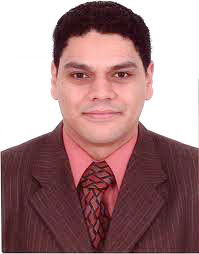
Moataz Billah Abdel-Fatah
Al-Watan newspaper
In an atmosphere energised with an increasing presence of Islamists in different institutions, Abdel-Fatah stresses that the most significant players in the political scene are those in opposition. While discussing the issue of opposition, the writer defines the term as the generator of rational democracy. In his perspective, opposition forces should not merely stand against the government or the state. Abdel-Fatah relates opposition to all former presidential hopefuls calling on them to unify efforts to establish a true democratic state. For many analysts, merging the efforts of Mohamed ElBaradei, Abdel-Moneim Abul Fotouh, Hamdeen Sabahy and Amr Moussa is dubious. The writer agrees that their ideologies are not compatible neither harmonious to build a fortified bloc. “It is not like one of them is a suit and the other is the tie,” Abdel-Fatah writes. In spite of demonstrating the rivalry generated from their distinct political tendencies, the writer still believes that the figures can work together on achieving dramatic developments similar to the weight of 25 January revolution. There is a historical responsibility that lies on the shoulders of the ex-presidential hopefuls. Abdel-Fatah reminds them of the importance of weighing the balance with Islamists, namely the Muslim Brotherhood and the Salafis. Egypt is in a dire need of balanced political ingredients.
Veiled news anchor
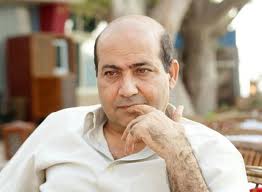
Tareq Al-Shenawi
Al-Tahrir newspaper
The appearance of the first Egyptian veiled news anchor prompted Al-Shenawi to examine the relation between the Muslim Brotherhood’s dominance of the media. The writer commences his column recalling the first statement of Fatma Nabil, the veiled newsreader, who affirmed that only now the 25 revolutionary goals have touched upon Egyptian media. Although it has been minimally acceptable for female hosts to appear with their head scarves on screens during the time of Mubarak’s more secular-minded authorities, the writer links the move to a political decision that strongly associates veiled anchors to the rule of the Muslim Brotherhood.
Al-Shenawi chides the fact that a headscarf has repeatedly cornered females to work beside rather than in front of the camera. The writer then expresses his fears that the opening space for covered women to read the news might create internal disputes inside several state TV stations. The move might build impressions that unveiled hosts can probably lose chance to excel and reach a stage of staying out of the top job with the increasing presence of veiled hosts. In Al-Shenawi’s perspective, a successful TV host will not be assessed on whether or not she decides to appear with a cover on the head. It is only her excelling performance and her charisma that decides on the amount of viewers and followers of any anchor’s program, Al-Shenawi notes.



